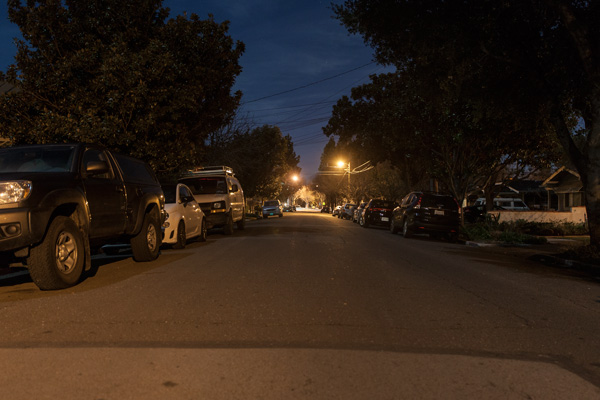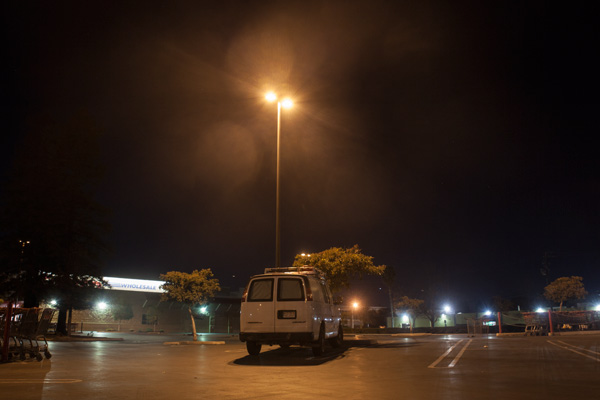One of the biggest concerns of those considering the vanlife is how to keep their vehicle and themselves safe and secure during their travels. This should shed some light on the topic.
Stealth van life
The biggest piece of advice I can give is to embrace the “stealth” van life. This is the practice of making it appear as if you don’t live in your van and your vehicle is just like any other vehicle on the road. This will give you the flexibility of staying out in nature when you want, but more importantly living in urban areas with ease and without hassle.
The best way to blend into your surroundings is by making your van look as unmemorable as possible on the outside. Since plain white cargo vans are so common as commercial work vehicles, if you live in one, you immediately gain some urban camoflage. For those living in camper style vans like a Vanagon or older VW, avoid lots of stickers or crazy paint jobs. These will make your van stand out and make it easier for local residents or authorities to notice you and your parking habits. Also, black out your windows with black out curtains or opaque window tint.
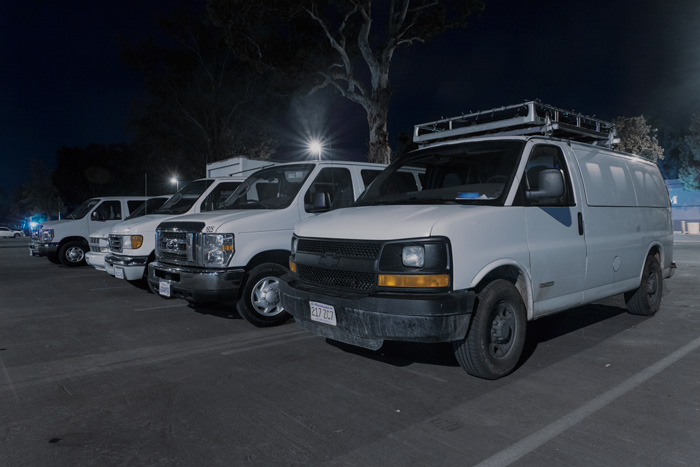
Goes to show how similar a cargo campervan looks to all the other work trucks next to it. Super stealth mode.
Sleeping in the van overnight
This used to be something I worried a lot about leading up to my move into the van. And to be honest, after about a week of traveling all my worries disappeared. If you have a stealthy van, and you use common sense, you’ll be able to find free, legal parking overnight quite easily.
The key to this is to never park in the same spot two days in a row. If you’re in an area for an extended amount of time, find several legal overnight parking spots and rotate between them every night. It’s also recommended to have a selection of “night” spots that are used only for sleeping and several “day” spots that you leave your van at during the day. Don’t stay up late watching a movie or cooking in your night spot. Don’t go outside your van to brush your teeth in your night spot. The night spot is for one thing and one thing only: sleeping.
When it comes to the actual act of sleeping, it’ll take time to adjust to the noise. Being parked and sleeping in the city, brings you a lot closer to the urban noises of the concrete jungle. Eventually you’ll learn to tune it all out. For the very light sleepers, there’s always earplugs.
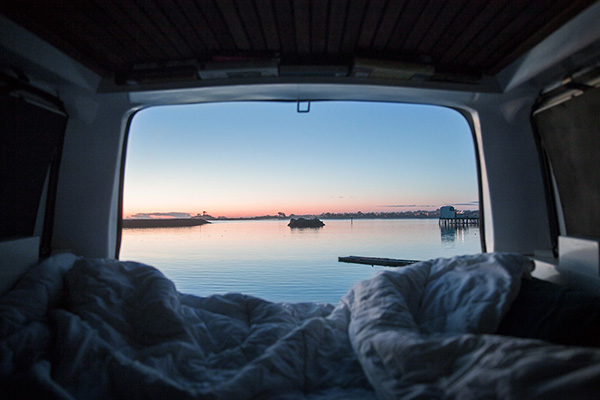
Wonderful views to wake up to in Northern California.
Where to park overnight
Out in nature: There are many amazing pieces of public land you can legally park and camp out on for days—sometimes even weeks at a time. Many of these spots are free to the public. Almost all BLM (Bureau of Land Management) and USFS (United States Forest Service) allows boondocking (which is the act of remotely camping outside developed campgrounds). The best way to find top-notch boondocking sites is to do your homework ahead of time. Search on forums or “boondocking websites”, ask a ranger at a nearby BLM or USFS office, or just pull out your gps/map. I’ve also found that since vans are relatively small and discreet compared to an RV, you can park overnight in parking lots and at trailheads in National Parks. Try to find places where other cars are left overnight from people staying at nearby hotels or people tent camping overnight within the park.
In the city: Similar advice for urban camping. The best place to park overnight in the city is anywhere where cars are normally left overnight or where it’s not uncommon for people to arrive and leave throughout the night. Places like hotel parking lots, 24 hour grocery stores, rest stops, and yes, even Walmart. However, in most cities it’s totally fine (and advised) to park on the street where most local residents park their cars. As long as you obey local parking signs and laws, you won’t have a problem.
Where to avoid parking overnight
After a while, you’ll begin to develop a sixth sense of what is a decent place to park overnight and what places to avoid. Almost every city has a “good” part of town where crime is relatively low and a “bad” part of town where there is a higher chance of a break-in. Use common sense. Avoid parking on dark, secluded streets or parking lots without many or any cars parked by you. I also try to avoid parking directly in front of a person’s house since most people are pretty aware of the “usual” cars in front of their abode. It raises suspicion and increases the risk of getting uninvited visitors.
The infamous knock
If you follow the above advice you won’t have to experience police or security knocking on your door in the middle of the night. However, some people regardless of how careful they are have gotten a knock on their door from cops or private security. What to do next is a somewhat controversial and divided subject. Some believe if you have been discreet, are positive you are parked legally and the person knocking on your door is unsure if someone is inside, it’s best to stay quiet, ignore the knocking and move your van once they leave.
However, if you’re unsure about being legally parked or police have noticed you living in your vehicle (by you not following the advice above), it’s best to turn on your lights and talk with them. And yes you do have inherent rights on US soil to what questions you need to answer and what police can search, but overall I’ve found it’s better and less aggressive to be honest, open and cooperative with them.
I’d tell them I’m traveling and just passing through the area. Most of the time they’ll tell you you can’t park in your current spot for any number of reasons (a sign you didn’t see or it being private property, etc) and they’ll ask you to move. To this I would then ask them where might be a good place to park—and then I’d move my van there. End of interaction. I have heard on rare, rare occasions of someone being fined and ticketed for improper parking or living in your van (if it’s illegal in the area), but these are extremely rare and something I’ve never experienced personally. Be safe, be nice, and know your rights.
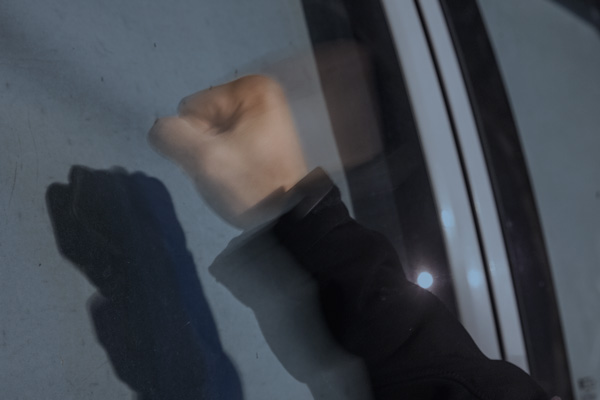
A visit from the cops at night is definitely an experience you want to avoid.
Van security
Most van dweller’s worst nightmares are about someone breaking into their van. Not only would they be breaking into a vehicle, but they would be breaking into a home. An incredibly invasive experience I’m sure. To prevent this, it’s incredibly important to lock your van if you step out—even for just a minute. You can get much more involved with your vehicle’s security if that’s something you feel is important or desired. Things like advanced alarm systems, door deadbolts, caged dividers, padlocked door locks or even GPS systems. For those with especially precious materials with them (laptops, passports, hard drives, camera gear), I’ve heard of folks securing a safe to their van’s floor. Just a thought.
For those leaving their van for an extended amounts of time (i.e. international travel) find a place that allows long-term parking that has some sort of night security, cameras, gate, etc. You may have to pay for this. This will ensure your home on wheels is safe and secure while you’re gone.

Locking your doors whenever you leave the van is an easy habit to practice. Just make sure not to lock your keys in your car. That’s happened a couple times to me.
Personal security
To protect themselves from a would-be burglar, some van dwellers feel the need to have some sort of “personal security” item with them in their van. Something like a bat, a taser or mace. I don’t carry any of those things with me because I feel like I’m smart enough about where and how I park to avoid an interaction with someone looking to steal things. However, in the extremely rare case that you hear someone starting to tinker with your doors or windows (the sounds of a would-be burglar), the best thing to do is to let it be known that someone is in the vehicle. Yell, bang on the walls or remotely start your car alarm.
99% of folks breaking into cars just want to break in, steal something, and get out quickly without anybody noticing them. If they know someone is in the vehicle, it’ll scare them and most likely get them to run off. I would then recommend moving your vehicle immediately after.
Like I said, to get a knock on your door from police is rare. To get someone to break into your vehicle (especially when you’re inside) is nearly impossible if you use your common sense.

This is my personal security. A thug of a bodyguard named Frank. Don’t mess with him. He’s a real prick.
The inevitable van breakdown
Your van is going to break down. It’s going to happen. Most likely it’ll be something small like a flat tire or dead battery. Hopefully, it’s nothing major (anything engine or transmission related). Regardless, it’s advisable to have a basic set of tools with you to do on-the-road repairs. A jack, jack stand and tire iron for the flat tire. A set of ratchets and wrenches for other small repairs.
If you do have a major breakdown happen to your van—something that is beyond your skill set or tool set—make sure to have a AAA membership. Call them up and they’ll get a tow out to you quickly and without trouble. It’s saved my butt on a number of occasions.
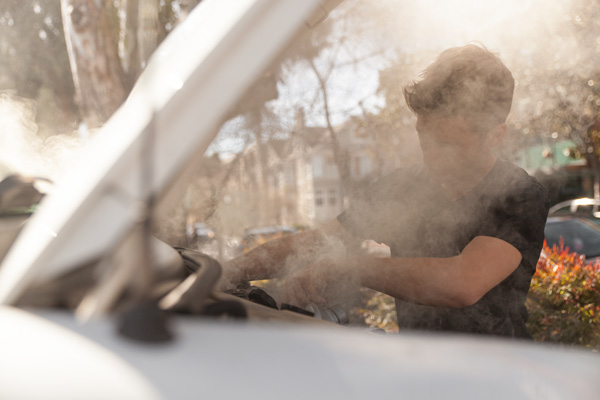
Fingers crossed you don’t have to deal with any breakdowns on the road. If you do though, make sure to stay patient and calm. Makes it much easier to sort things out.
Follow the adventure on Instagram
Proudly hosted by Media Temple.
©2016 All rights reserved.

